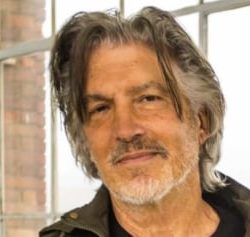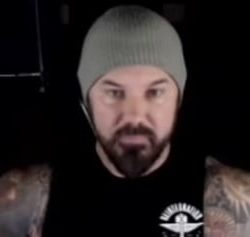
ALBUM REVIEW: Crimson Thunder (20th Anniversary Edition) – HammerFall
Where would HAMMERFALL be without Hearts On Fire? Well, they’d probably still be doing pretty decent business, but a few places lower on the festival line ups. For the past…
Read more »
LAMB OF GOD Recruits Ex-MACHINE HEAD Guitarist PHIL DEMMEL For Three South American Shows
Former MACHINE HEAD and current VIO-LENCE guitarist Phil Demmel is filling in for Willie Adler on three South American LAMB OF GOD shows this week. Demmel previously stepped in for Adler during LOG’s European tour in August 2022, the January 2022 appearance on the ShipRocked cruise and in May for th…
Read more »
ALBUM REVIEW: Dreams Of Lands Unseen – Ignea
Almost certainly the first concept album about Ukrainian photographer and travel writer Sofia Yablonska, melodic metallers IGNEA bring her adventures to life through their diverse musical palette and knack for…
Read more »
Interview with Scott Colley, Part Two
Last month, I had the immense pleasure of speaking with New York upright-bass extraordinaire Scott Colley. Over the last 40 years, Scott has played in all kinds of amazing situations led by some of the most celebrated names in jazz, including Herbie Hancock, Abbey Lincoln, Pat Metheny, Michael Brecker, Andrew Hill, Chris Potter, Roy Hargrove, Dave Binney, Carmen McRae, Joshua Redman, and so many others. Naturally, we had so much to discuss that one article just wasn’t enough (see last month for the first part of this interview). This portion focuses on more bass-specific questions from that same interview.PG: Scott, you’ve had some really incredible bass teachers, and you’ve also been teaching for many years: What are four things that you think every bassist should work on?Scott Colley: These four things apply to every instrument. I want to stress that the things that are important for bassists to work on are also important for every other instrument. As a bassist, you definitely know when you play with somebody who hasn’t mastered these four things. All of the instrumentalists that I love to hear as bass players, and the people that I love to hear on any other instrument, have these very solid components in common. Lastly, none of the things that I’m about to mention are things that you achieve and are yours for life. They’re a process and need to be nurtured constantly. I still regularly work on these myself.One—consistent time. This will serve you in any genre of music. Whether you’re required to maintain consistent time or not in the music you’re currently playing, your ability to do it when it’s necessary, or in other words, maintain the same tempo from point A to B, is vital. You have to nurture this skill constantly because as you play with different people, even great drummers, they’ll influence what we’ll broadly refer to as “your absolute time.” For sure, as a bassist, this is a skill that you need.Two—feel. Your relationship to time in the moment, like: “What does this feel like? Am I playing a funk groove, is it swinging, is it straight eighths?” Whatever the feel—and this is true of classical music; this is true of everything—does it feel good? Does it feel the way that I intend?“I still practice each one of these things that I’m mentioning to you every day, even if it’s for 10 minutes before I go to a soundcheck, while I’m on the road playing every night.”PG: So, how do you go about working on these?Colley: The way I practice these is with a metronome or some form of “absolute,” knowing that playing with individuals is not that. But I’ll practice with a metronome for a while, and then, after a certain time, turn the metronome off and turn the recorder on. I’ll analyze the recording for:A—Is my time consistent? Am I able to maintain a consist tempo from point A to B? And B—Does it feel good in the moment? If not, then why? What am I not making in the groove, or what was I doing when the tempo drifted from 60 bpm to 65 bpm? What was I doing in that moment—triplets, quintuplets? Did I not know where to shift?PG: How long are these recordings you make?Colley: They’re all just really short. Just one to two minutes.Three—tone. When I went to California Institute for the Arts, I was very fortunate to work with a bass player named Fred Tinsley, who was in the Los Angeles Phil [Philharmonic] and, before that, the New York Phil. He also played with Dexter Gordon and a bunch of other great jazz musicians. He sounded a lot like Wilbur Ware when he played jazz and was an amazing classical bassist. The whole physical approach that I have to the instrument is distilled from things that I learned with Fred. Fred was all about using the weight of your body to play the instrument and the things that are challenging on acoustic bass. So, when I started working with Fred weekly, he was like, “Whoa, whoa, whoa…. Slow down all that stuff. Here’s the bow. Use the bow.” He slowed everything down and had me play long tones all the time, focusing on finding a center on the instrument. He would say, “There’s no hurry to learning this. There’s no shortcut to learning this.” Four—intonation. Lastly, working on intonation on acoustic bass is a constant. Again, it’s not some trophy that you obtain where you say, “I now have great intonation.” It takes constant work and maintenance. Yes, it’s about “Where does my hand go,” but also, “Once my hand is in that right position, am I really listening to the note?” As with any other person who is 18, 19, 20 years old, I also wanted everything to “happen now.” But now that I’ve been doing this for decades, I still practice each one of these things that I’m mentioning to you every day, even if it’s for 10 minutes before I go to a soundcheck, while I’m on the road playing every night. These are the fundamentals that I will constantly work on until I stop playing. You know … that’s just the way it is!
Read more »
Cory Wong and Wampler unite for the Wong Compressor – “the most versatile compressor that has ever existed”
The dual-function stompbox features a flexible compressor circuit, a boost inspired by an Eric Clapton-favored unit, and offers an XLR output for connecting straight to PAs, mixers and audio interfaces
Read more »
Brandon Ellis laid down the gauntlet to Jackson’s Master Builders with this 27-fret Gold Crackle Kelly – is this one of the most challenging custom builds ever made?
See the latest guitar borne from the friendship between one of heavy music’s most innovative players and Jackson’s metal-obsessed master builder, Joe Williams
Read more »
PHIL DEMMEL Reflects On His Audition To Become SEPULTURA's Singer: 'It Was A Good Experience'
During an appearance on “Put Up Your Dukes”, the podcast hosted by ex-EXODUS singer Rob Dukes, former MACHINE HEAD and current VIO-LENCE guitarist Phil Demmel reflected on his audition for the lead-singer position in SEPULTURA when Max Cavalera quit the latter band in 1996. Speaking about how his au…
Read more »
GEORGE LYNCH Is 'Conflicted' About Performing Under LYNCH MOB Name Again
In a new interview with Anne Erickson of Audio Ink Radio, legendary DOKKEN axeman George Lynch spoke about his decision to return to using the LYNCH MOB name for his solo project.
For much of 2021 and 2022, George had played dates around the U.S. under the name ELECTRIC FREEDOM, which he previously…

TIM LAMBESIS Confirms New AS I LAY DYING Members Are Contributing To Next Studio Album
In a new interview with Heavy New York, AS I LAY DYING’s founding vocalist Tim Lambesis has confirmed that he and his bandmates have commenced the recording process for their next studio album. The LP will mark the group’s first with its new lineup, featuring Lambesis and longtime guitarist Phil Sgr…
Read more »
Rights To First Two JUDAS PRIEST Albums Acquired By REACH MUSIC PUBLISHING
Reach Music Publishing has acquired both the master and publishing rights of JUDAS PRIEST’s “Rocka Rolla” and “Sad Wings Of Destiny” albums from Gull Entertainments.
Reach will be working in partnership with JUDAS PRIEST on these two albums and is planning a variety of projects to be announced later…
